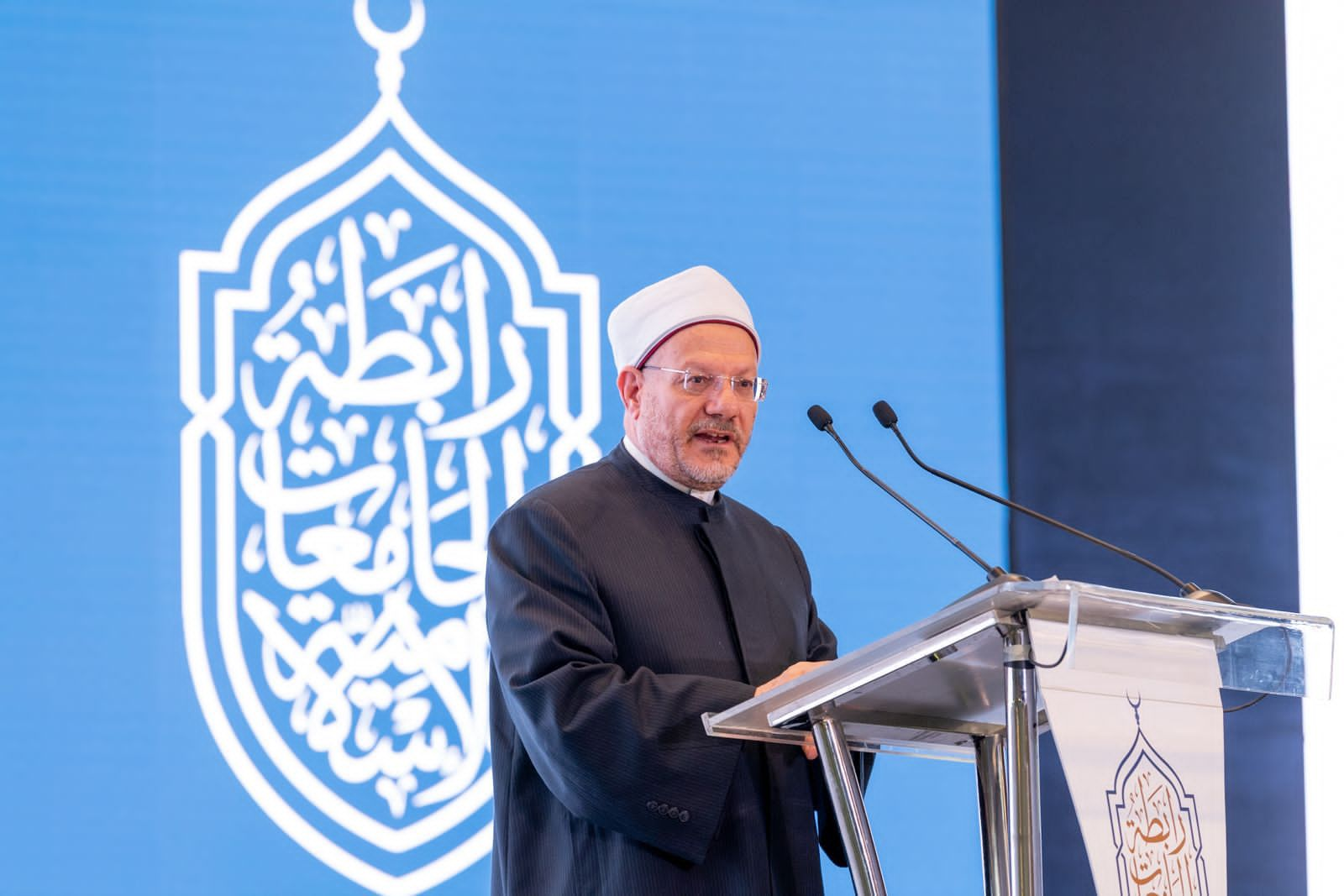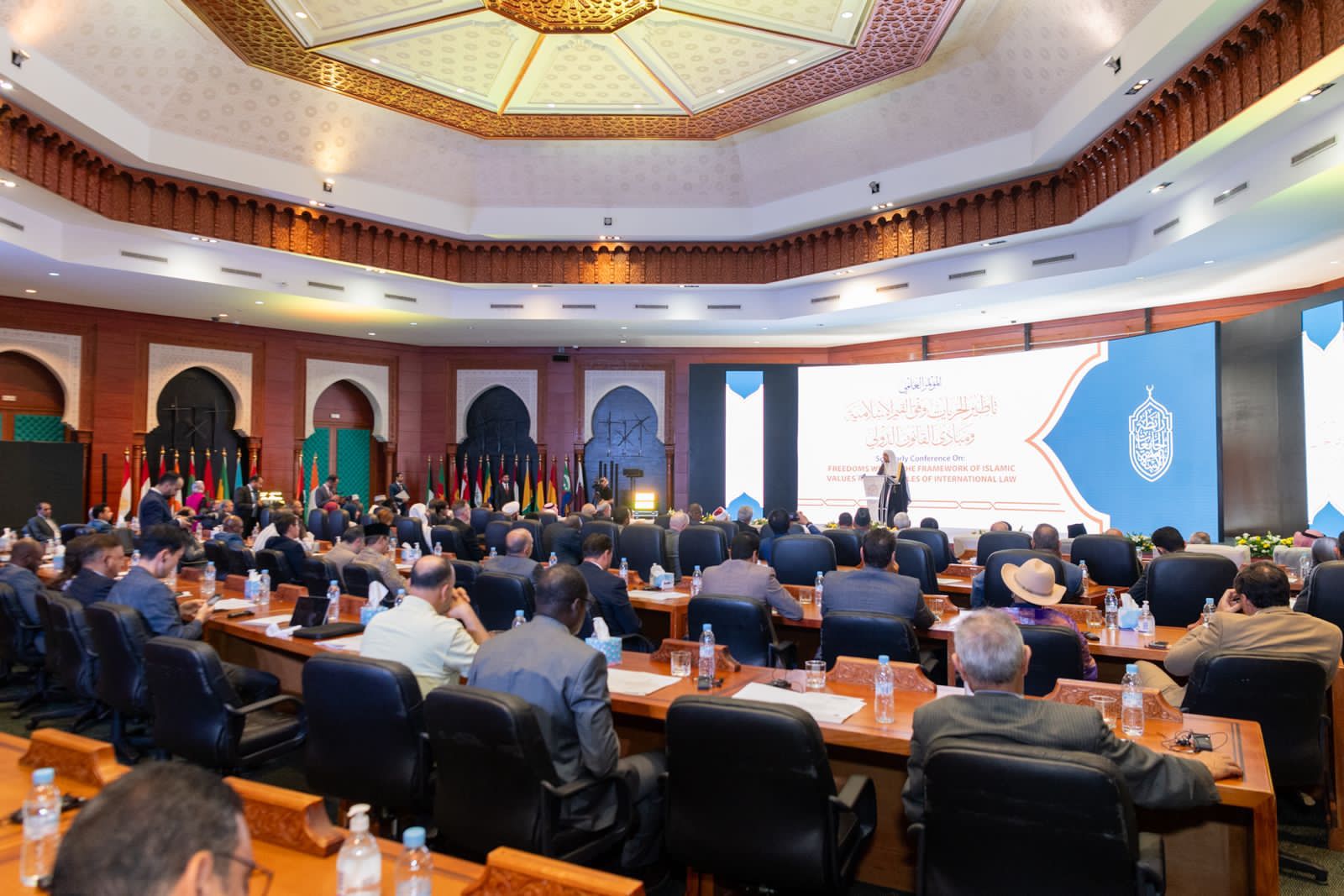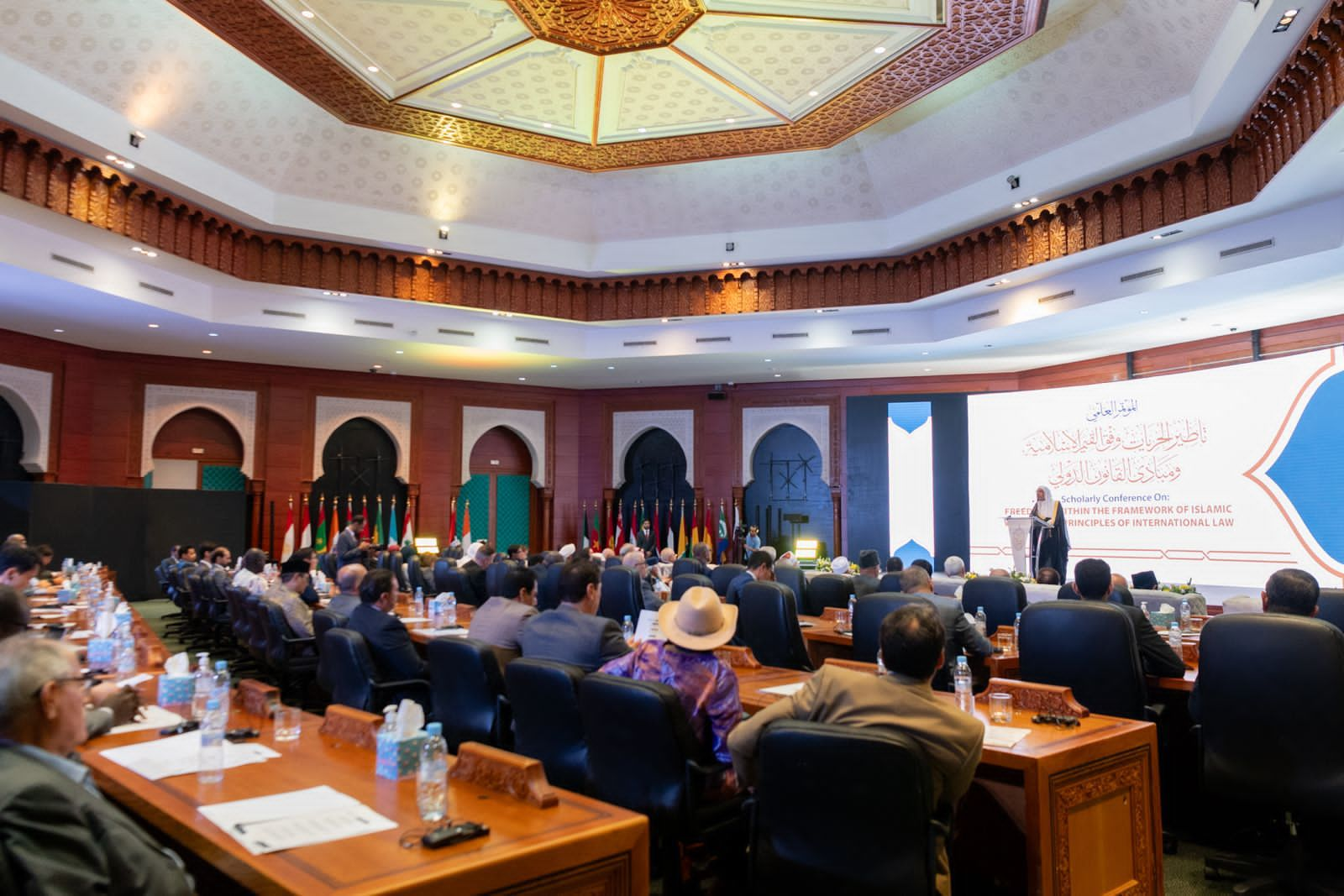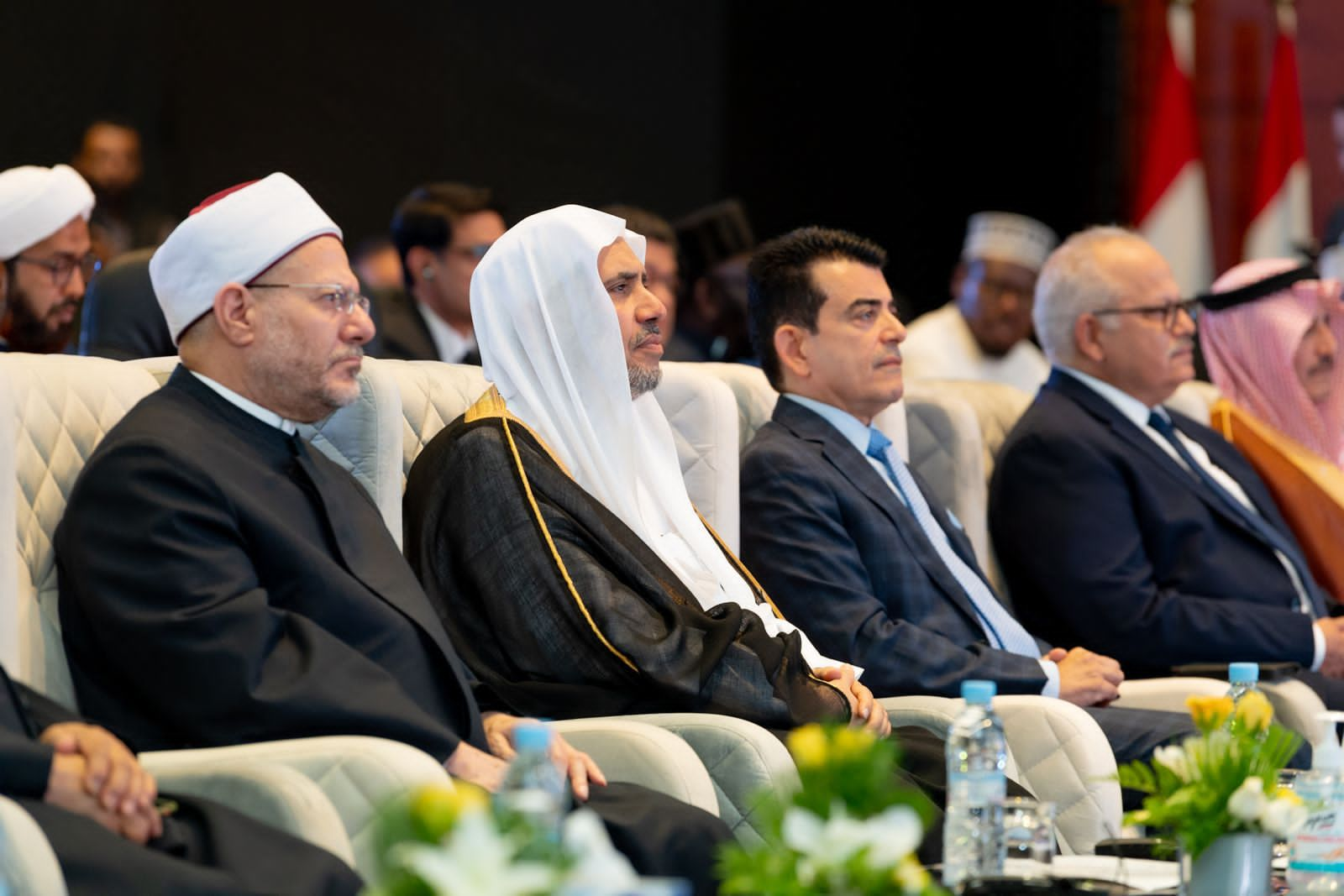The Association of Islamic Universities’ scientific conference was held under the theme: ” The Framing of Freedoms in accordance with Islamic Values and the Principles of International Law
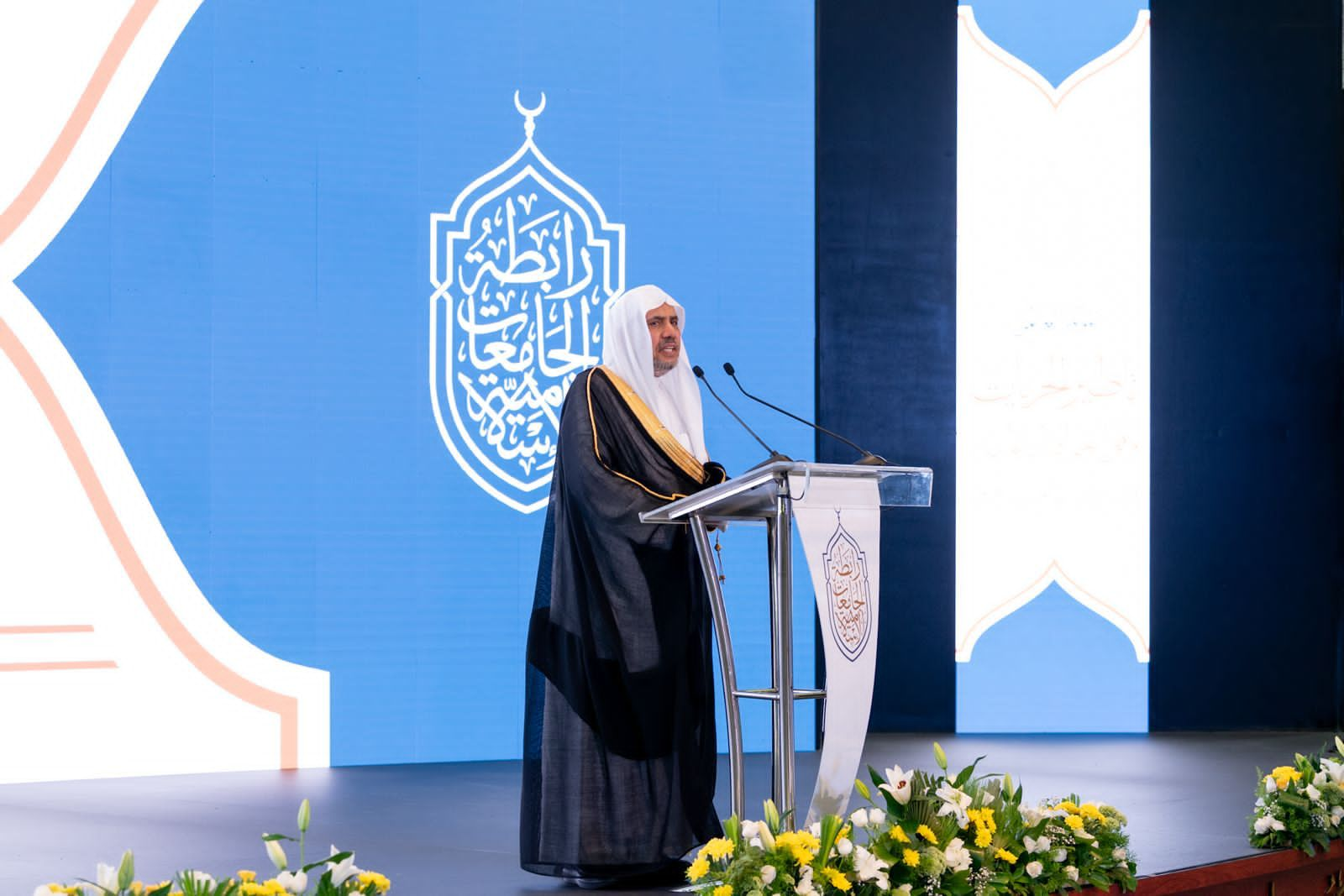
The declaration of the Association of Islamic Universities called on countries that allowed the burning of copies of the Holy Quran to review their constitutional concepts and enhance their cultural awareness.
The declaration affirmed the right to freedom of expression in accordance with frameworks that put into consideration the requirements of peace in our world and the harmony of its national societies. It warned against fueling religious feelings and racist tendencies.
• It called on the world states to respect their obligations under the International Covenant on Civil and Political Rights, develop coexistence and tolerance strategies, and adopt legislation prohibiting incitement to hatred.
• It further called for the inclusion of educational subjects in school curricula around the world that enhance societal awareness of respect for others and understanding of their right to exist and live with dignity without undermining their dignity or desecrating their religious sanctities.
Dr. Muhammed Al-Issa:
– Interpreting constitutional texts in a way that makes them deviate from their spirit that calls for the peace of societies and the promotion of friendship among nations and peoples is wrong and dangerous.
– Logic does not accept the legislative understanding of freedoms to be without fixed frameworks!
Grand Mufti of Egypt:
The practice of freedoms in accordance with religious and legal controls restricts instigators of strife and unrest
Dr. Sharif:
– Human rights and freedoms are central to the purposes of Islamic law
– The Conference recommends that national states develop strategies of coexistence, mutual respect, and rejection of all words or deeds that incite hatred
Rabat
The Association of Islamic Universities invited representatives of Islamic fatwa bodies and councils, major universities, international law experts, academics, and intellectuals to discuss the issues of freedom and their impact in reality and practice, during its international scientific conference held under the theme: “Framing freedoms in accordance with Islamic values and the principles of international law”, which was organized at the headquarters of ISESCO in the Moroccan capital, Rabat. The conference was inaugurated by His Excellency the President of the Association of Islamic Universities, Sheikh Dr. Muhammad Al-Issa.
The conference was held in light of the rise in the number of crimes committed against Islamic and religious sanctities in general, under the pretext of “freedom of opinion and expression”. It included scientific sessions that discussed important issues to remove confusion about this noble human value, which is highly upheld by the religion of Islam, and establish the hoped-for academic role that will help raise awareness and stimulate thought to build a future capable of enhancing solidarity, understanding, and respect among followers of religions and civilizations, and confronting the ideas of civilizational clash and religious conflict.
In his inaugural speech, Dr. Al-Issa stressed that common sense does not accept the legislative understanding of freedoms to be without a fixed framework that preserves values, protects rights, especially the dignity of others, and their sanctities, in particular, and prevents ignorant and malicious people from employing the right to freedom of expression in a way that undermines the peace of our world and the harmony of its national societies.
He said: “The spirit of civilized constitutions does not allow inciting hatred or fueling civilizational conflict in their name, so their contexts must be understood and then applied in order to achieve their goals based on normal human logic that calls for promoting the values of respect and harmony, and preventing the risks of conflict and clash among nations and peoples”.
“Interpreting constitutional texts in a way that makes them deviate from their spirit that calls for the peace of societies and the promotion of friendship among nations and peoples is wrong and dangerous,” he said.
For his part, the Grand Mufti of Egypt, Dr. Shawky Ibrahim Allam, delivered a speech in which he pointed out that today Muslims are facing a technical revolution in which ideas, visions, philosophies, and concepts are spread through several channels, causing confusion among people. He further explained that the practice of freedoms in accordance with religious and legal boundaries guarantees societies their security and safety, maintains security and psychological peace for individuals, and restricts instigators of strife and unrest.
The Secretary-General of the Association of Islamic Universities, Prof. Dr. Sami Muhammad Al-Sharif, drew attention to the fact that the conference’s main target was to discuss the concept of rights and freedoms in the world. Dr. Al-Sharif explained that the system of religious values confirms the fact that all human beings came from one origin and that human rights and freedoms are pivotal, considering that human rights, with human freedoms at the core, are a key axis of the purposes of Islamic law.
For his part, His Excellency the Director General of the host organization, ISESCO, Dr. Salem Al-Malik, said that the issue of freedoms is no longer a theoretical issue dealt with through books and articles and thought of from the standpoint of cultural and social luxury, rather it now has an overwhelming presence on the overall human movement.
Then the conference sessions followed, in which senior scholars and academics, including presidents of major universities in the Islamic world, delivered speeches tackling the theme of the conference, including details of its important topics.
In their final communiqué, the participants affirmed their agreement that:
– Honoring and respecting the human being is agreed upon by the followers of religions and cultures (and qualifying the human being spiritually, intellectually, and materially is the main pillar on which civilized societies are built to reform the earth and guarantee the happiness of man).
– Considering freedom as a supreme human value guaranteed to everyone, but – like other values and principles – it is not random or synonymous with chaos and absurdity, since it includes important responsibilities and duties that should be observed by everyone, otherwise this pivotal human common factor in the building of the relationship among nations and peoples and within diverse national societies would be misused and distorted.
– Unrestricted freedom is a crime against its moral values and its legal and civilized concepts since it does not respect the value of man when it violates his dignity under its false umbrella. Hence it is considered a means of destroying our civilizational alliance and friendship among nations and peoples (history bears witness that unrestricted freedom is one of the main reasons for the dismantling of our human unity, as well as tampering with the cohesion of our national societies).
– Human diversity and the inevitability of disagreement is a reality that requires full understanding and calls for positive giving, benevolence to others, commitment to noble values, recognition of others’ existence and civilization, respect for their privacy, and the preservation of their rights.
– Coexistence among the components of society is a necessity based on the recognition of the unity of all human beings, the strengthening of human relations, the development of national feeling, and the building of bridges of understanding between the different nations according to rules imbued with the spirit of responsibility and keenness on harmony, integration, and cooperation.
– The gravity of the situation that our world is going through today requires awareness that repulses the calls for extremism, selfishness, hatred, and isolation, by adopting effective dialogue to resolve conflicts, rationalize dealing with differences, and achieve understanding among disputing parties, in order to enhance trust, remove fears, and correct misconceptions.
The conference issued the Declaration of the Association of Islamic Universities, which contained the following recommendations:
– The word is a moral and spiritual responsibility, which should not be uttered without knowledge or proof, thus offending others, and inciting religious feelings and racial tendencies.
– Affirmation of the right to freedoms in general, and freedom of expression in particular, in accordance with frameworks that preserve the rights of others, particularly their dignity, and meet the requirements of peace in our world and the harmony of its national societies.
– Calling on media institutions to improve media content towards strengthening the bonds of human and national fraternity and mutual respect, and confronting all calls for hatred and incitement to clash and civilizational conflict.
– States must respect their obligations under the International Covenant on Civil and Political Rights, develop strategies for coexistence and mutual respect, and adopt legislation prohibiting incitement to hatred leading to extremism, and a cycle of chaos, violence, and counter-violence.
– Condemning the phenomenon of Islamophobia as a racist discourse that fuels hatred, breeds violence, and undermines projects to build societies based on harmony and peace, and warning against the consequences of religious provocation in a world that is in dire need of calm, understanding and mutual respect.
– Calling on governments and peoples to overcome past differences between religious, ethnic, and cultural components, and discuss the problems of coexistence with a civilized vision based on a full understanding of God’s wisdom as regards the inevitability of differences and diversity, and the belief in the importance of cooperation, and deserved mutual trust, and the investment of their commonalities in promoting awareness to create societies that go beyond material civilization to moral civilization.
– Calling for the inclusion of educational subjects in school curricula around the world that enhance societal awareness of respect for others and understanding of their right to exist and live with dignity without undermining their dignity or desecrating their religious sanctities
– Calling upon those states that have allowed the burning of copies of the Holy Qur’an to revise their constitutional concepts, enhance their civilizational awareness, recall the lessons of history, and not to confuse the human meaning of freedoms with chaos that distorts that meaning, especially that the loose meaning of freedom allows the undermining of the dignity of others and the incitement to confrontation among nations and peoples simply because of their religious and intellectual differences, this is in addition to the mutual misunderstanding, thus deepening the gap among humans, whose differences and diversity are ordained by God with His knowledge and wisdom.
The conference was widely covered by Arab, Islamic, and international media.
